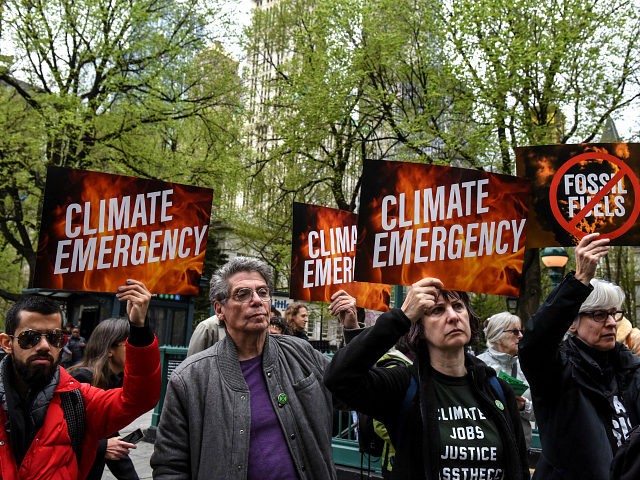The United Nations said Tuesday the humanitarian consequences of the “climate emergency” will be far worse unless “drastic efforts” are made to curb global emissions.
In its message on Twitter Tuesday, the U.N. Office for the Coordination of Humanitarian Affairs (UNOCHA), established to “strengthen the international response to complex emergencies and natural disasters,” links to a U.N. article insisting that climate change is not a distant vision of a troubled future but a reality of today.
“Human-induced global warming has spurred a near doubling of natural disasters in the past 20 years,” the article alleges. “At least 7,348 major disasters occurred between 2000 and 2019, claiming 1.23 million lives and affecting 4.2 billion people worldwide.”
To justify its claim that global warming has caused a near doubling in natural disasters, the article links to a report from yet another U.N. office, which, unsurprisingly, never even makes that assertion.
“In 2019, 34 million people globally were acutely food insecure due to climate extremes; weather-related hazards triggered some 24.9 million displacements in 140 countries,” the article continues.
The unfolding climate emergency is “adding an additional layer of stress to humanitarian organizations that are already stretched thinner than ever before,” the article proposes.
The article continually conflates climate change with extreme weather events, which of course are not the same things and between which no quantifiable correlation has been established.
“Climate change affects every corner of the world, but the impacts are felt unequally,” it declares before its subtle bait-and-switch. “People in low-income countries are at least four times more likely to be displaced by extreme weather than people in rich countries.”
The article goes to the shameful extreme of linking the fate of one person, an 81-year-old Sudanese man named Bak who was stranded in water for days in 2020 after his native land was inundated by terrible floods, with global warming.
“People like Bak are the least responsible for global greenhouse gas emissions, yet they’re bearing the brunt of climate change,” the article boldly alleges.
In its alarmist propaganda against the evils of climate change, the United Nations has found itself unable to wait for concrete scientific data to verify its claims. Instead, it now regularly resorts to unscientific inuendo and conjecture in the hope that no one will ask it to prove its assertions.
Many serious climate scientists have pointed out the practical impossibility of connecting any single weather event with climate change, a practice known as event attribution or climate change attribution.
As the Intergovernmental Panel on Climate Change (IPCC) has noted: It is impossible, even in principle, to distinguish formally between all conceivable explanations with a finite amount of data.”

COMMENTS
Please let us know if you're having issues with commenting.